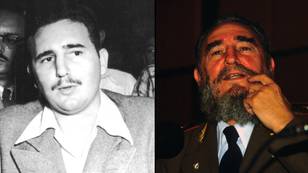Fidel Castro, the former president of Cuba and one of the world's longest-serving leaders, had a reputation for his amorous exploits, allegedly sleeping with at least two women every day, according to a former insider.
This revelation has sparked new debates about Castro's character and the impact he had on Cuba.
While supporters of Castro believe that he returned power to the people after overthrowing the government in 1959, critics argue that he was a dictator.
His divisive legacy continues to be a topic of discussion even after his death in 2016.
Despite the controversy surrounding him, Castro remained in power for an impressive 47 years, from 1959 to 2006.
However, a former Castro official named Ramon claims that his numerous affairs played a significant role in his longevity as president.
Ramon alleges that Castro slept with approximately 35,000 women throughout his life.
According to the insider, Castro would have intimate encounters with at least two women daily for over four decades, with one woman for lunch, another for supper, and sometimes even one for breakfast.
The access to “incredible women” is believed to have contributed to his ability to stay in power for so long.
In other news related to Castro, it has been reported by Deadline that actor James Franco will portray him in an upcoming biopic about the life of Alina Fernández Revuelta, Castro's daughter.
The film, titled “Alina of Cuba” and directed by Miguel Bardem, will focus on Fernández's experiences as one of her father's most vocal critics.
Fernández, who eventually exiled herself to Spain, lived in Cuba until 1993.
She fled the country using false papers and a wig to escape her father's regime.
Natalia ‘Naty' Revuelta, who had a romantic relationship with Castro and bore his child, will be played by Mía Maestro in the film.
John Martinez O'Felan, the lead creative producer of the biopic, expressed the project's goal of creating an inclusive and diverse piece of modern Hispanic history.
The film aims to unite actors and creatives from different generations and Latin backgrounds, both from the U.S., Latin America, and the rest of the world.
As discussions surrounding Castro's controversial legacy continue, it remains to be seen how these portrayals in the media will shape public perception of the former Cuban leader.































